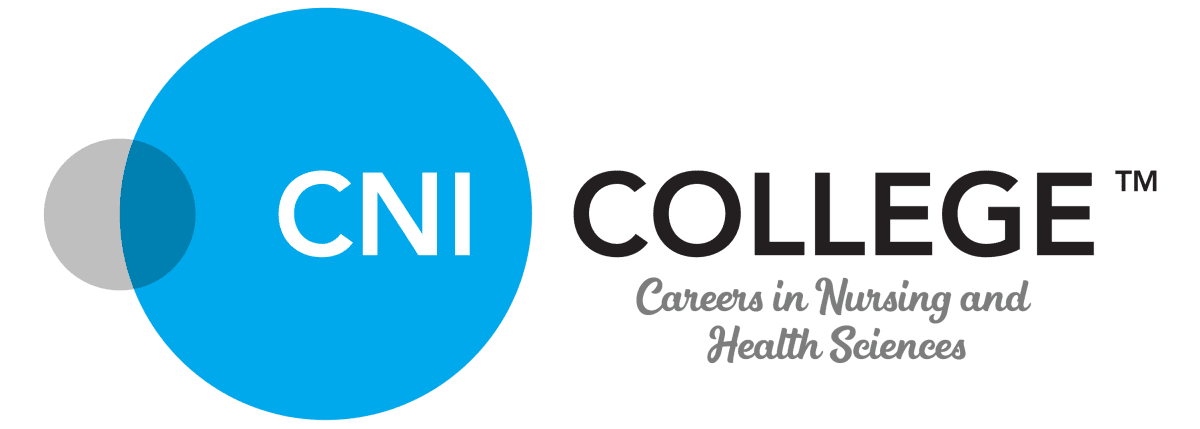Vocational Nursing School
Built to align with the real-world responsibilities of practical nurses.
Page Contents
Discover Our Vocational Nursing Program at CNI College

The Vocational Nursing Program at CNI College is designed to empower students with the essential knowledge, skills, and competencies for enhancing the health and well-being of individuals. It prepares students to provide basic nursing care for acutely and chronically ill clients across a variety of settings, including hospitals, skilled nursing facilities, clinics, doctor’s offices, long-term care, corrections, home health care, and nursing registries. With an emphasis on developing competencies for predictable health outcomes in structured environments, the program lays a solid foundation for a rewarding career in nursing, ensuring graduates are well-equipped to meet the demands of their future roles in healthcare.
Program Goals and Objectives
The primary goal of the Vocational Nursing diploma program at CNI College is to provide a comprehensive education that blends practical medical knowledge with compassionate patient care, preparing students to become proficient licensed vocational nurses (LVNs). This career path is not only rewarding but also critical in the healthcare system, as it requires a dedication to patient well-being and medical excellence.
Students in the program are engaged in a rigorous curriculum that includes both classroom instruction and the required clinical experiences. These components are designed to equip students with real-world skills and knowledge necessary for entry-level employment as Licensed Vocational Nurses upon successful completion of the program.
A significant focus is placed on preparing students to take and pass the National Council Licensure Examination (NCLEX-PN), which is essential for licensure as a practical or vocational nurse. The culmination of the program is a comprehensive review course, specifically tailored to reinforce all learned material and to intensify preparation for the NCLEX-PN, ensuring that graduates are thoroughly prepared for their licensing exams and ready to embark on their nursing careers with confidence.
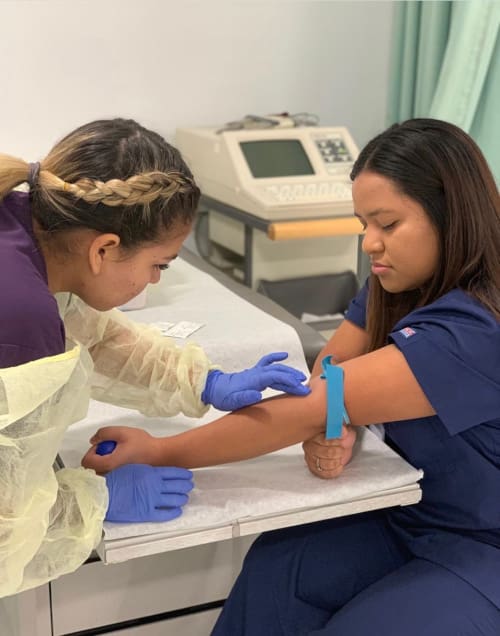
Program Duration and Structure
The Vocational Nursing Program at CNI College is structured to accommodate students through a comprehensive curriculum spread across four terms. The program is designed to last 21 months on a part-time schedule. This duration and structure are thoughtfully crafted to ensure that all students receive a thorough and immersive educational experience, preparing them for a successful career in vocational nursing.
Curriculum and Course Overview
CNI College offers an integrated approach to nursing education, combining theoretical knowledge with practical skills. The curriculum encompasses a broad spectrum of subjects, including anatomy and physiology, pharmacology, pediatric and medical-surgical nursing, as well as mental health nursing, ensuring students receive a comprehensive foundation in nursing principles and practices.
Clinical experiences and hands-on training form a critical part of the curriculum, providing students the opportunity to apply classroom learning in real-world healthcare settings under the supervision of experienced professionals. This blend of academic rigor and practical application prepares students thoroughly for the National Council Licensure Examination (NCLEX-PN) and a successful career in vocational nursing, equipping them with the competence and confidence to excel in diverse healthcare environments.

RN To BSN Degree
The emphasis on evidence-based clinical practice and leadership can land you in roles where your problem-solving skills are needed and well respected.
CNI College Online Admissions Application
If You Are Ready To Get The Education You Need To Start Your Career In The Healthcare Field.
- This is a foundational course that introduces students to the nursing profession, offering an in-depth orientation to CNI College and outlining the essential role of student nurses. This course covers the critical policies and procedures of the program, laying the groundwork for basic nursing skills and concepts necessary for supporting clients in their healthcare needs. Key topics include growth and development, effective communication, interpersonal skills, physical assessment, documentation, safety, emergency procedures, infection control, and considerations around death and dying. Additionally, the course introduces medical terminology, Orem’s self-care theory, and the nursing process, complemented by an active skills lab component for practical application. VN 100 is pivotal in establishing the initial skills that will underpin all subsequent specialty areas of clinical nursing, incorporating Assessment Technologies Institute (ATI) materials and requiring weekly ATI SmartPrep Plan activities to bolster reading, writing, science, and math competencies.
- This course advances the foundational concepts introduced in earlier courses, setting the stage for more complex studies in nursing. This term focuses on the nursing care of surgical clients, both pre and post-operative, and initiates the study of anatomy and physiology alongside pharmacology. Key to this course is the application of pharmacology principles, including medication actions, interactions, and the study of individual medications. Emphasis is placed on calculating medication dosages, as well as the preparation, administration, and storage of medications. Similar to its predecessor, VN 105 integrates an active skills lab component for hands-on learning and continues the use of Assessment Technologies Institute (ATI) materials as an enhancement tool. Students will be required to complete weekly ATI SmartPrep Plan tasks aimed at improving reading, writing, science, and math skills, further preparing them for subsequent coursework and clinical practice.
- Life Cycles, Integumentary System delves into the developmental stages of middle adulthood, covering the age range of 35-65. This course explores the physical, social, and emotional characteristics unique to this life stage, providing students with a comprehensive understanding of adult development. Additionally, it offers an in-depth look at the anatomy and physiology of the integumentary system, covering the etiology of common integumentary disorders and diseases, along with diagnosis, treatment, and prevention strategies. Pharmacological treatments and nutritional needs associated with these conditions are discussed, alongside assessment and emergency treatment of major burns, highlighting the nursing interventions and psychosocial care aspects for clients with integumentary disorders. Practical application of these concepts is supported through selected clinical experiences, enabling students to practice relevant nursing skills. The use of Assessment Technologies Institute (ATI) materials enhances the course content, ensuring a well-rounded educational experience.
- VN 200B is tailored to introduce students to the comprehensive anatomy and physiology of the musculoskeletal system, including muscles, bones, and related structures. This course guides students through the etiology of common musculoskeletal disorders and diseases, alongside their diagnosis, treatment, and prevention. Discussion extends to related pharmacological treatments, nutritional needs, and the impact of aging on the musculoskeletal system. A significant focus is placed on nursing interventions and addressing the psychosocial aspects of caring for clients with musculoskeletal disorders. Through selected clinical experiences, students have the opportunity to apply and practice relevant nursing skills in real-world settings. The curriculum is enhanced with Assessment Technologies Institute (ATI) materials, providing a richer learning experience and preparing students for successful clinical practice.
- This course offers students a detailed exploration of the anatomy and physiology of the upper and lower respiratory systems. This course presents the etiology of common respiratory disorders and diseases, covering their diagnosis, treatment, and prevention. Students will learn about related pharmacological agents, oxygen precautions and interventions, and the nutritional needs associated with respiratory conditions. The curriculum focuses on nursing interventions and the psychosocial care aspects for clients with respiratory disorders, ensuring a comprehensive understanding of patient care. Selected clinical experiences are included to provide students with the opportunity to apply and refine their nursing skills in practical settings. The course content is further enriched by the use of Assessment Technologies Institute (ATI) materials, aiding in the enhancement of the learning experience and preparation for professional practice.
- The Cardiovascular System course provides an in-depth study of the heart’s anatomy and physiology, along with a detailed examination of blood circulation throughout the body. This course clarifies the distinctions between veins and arteries, and blood and lymph, as well as the differences between angina and myocardial infarction (MI). It introduces students to the etiology of common cardiovascular disorders and diseases, encompassing their diagnosis, treatment, and prevention. Discussion includes related pharmacological agents and the nutritional needs essential for managing cardiovascular conditions. A significant emphasis is placed on nursing interventions and addressing the psychosocial care needs of clients with cardiovascular disorders. Through selected clinical experiences, students are given opportunities to practice and enhance their nursing skills in real-life settings. The course utilizes Assessment Technologies Institute (ATI) materials as an integral tool for enriching course content and aiding in the comprehensive preparation of students for their future roles in healthcare.
- VN 200E delves into the intricate anatomy and physiology of the gastrointestinal system, including its accessory organs and the digestion process. This course covers the etiology of common gastrointestinal disorders and diseases, providing insights into their diagnosis, treatment, and prevention. Students will explore related pharmacological agents and the specific nutritional needs associated with gastrointestinal health. Emphasis is placed on nursing interventions and understanding the psychosocial aspects of caring for clients with gastrointestinal disorders. Through selected clinical experiences, students have the opportunity to apply their learning and practice essential nursing skills in authentic healthcare settings. The use of Assessment Technologies Institute (ATI) materials enhances the course content, supporting a thorough and enriched learning experience that prepares students for successful clinical practice.
This course offers an extensive overview of the endocrine system’s anatomy and physiology, focusing on the role of hormones, their negative feedback mechanisms, and specificity to target cells and organs. This course introduces students to the etiology of common endocrine disorders and diseases, covering their diagnosis, treatment, and prevention. The discussion extends to related pharmacological agents and the dietary needs essential for managing endocrine conditions. A notable emphasis is placed on nursing interventions and the psychosocial care of clients with endocrine disorders, with particular attention to the management of diabetes, including insulin administration and monitoring for diabetic complications. Through selected clinical experiences, students are encouraged to apply their knowledge and develop their nursing skills in real-world scenarios. The curriculum is further enriched by Assessment Technologies Institute (ATI) materials, enhancing the educational content and preparing students for effective clinical practice.
- VN 300B Reproductive System explores the complex anatomy and physiology of the human reproductive system, offering insights into both male and female reproductive health. This course guides students through the etiology of common reproductive disorders and diseases, including their diagnosis, treatment, and prevention. Students will learn about the pharmacological agents used in the treatment of reproductive health issues and the nutritional needs relevant to reproductive health. The curriculum places a strong emphasis on nursing interventions and understanding the psychosocial aspects of caring for clients with reproductive disorders. Additionally, students will examine the special considerations in maternal and newborn care, fertility issues, and sexually transmitted infections. Selected clinical experiences are integrated into the course, allowing students to practice and refine their nursing skills in a practical setting. The use of Assessment Technologies Institute (ATI) materials will enhance the course content, providing a comprehensive educational experience aimed at preparing students for effective practice in reproductive health nursing.
- The Renal/Urinary System course provides a comprehensive introduction to the urinary system, detailing its anatomy and physiology, including urine formation, fluid and electrolyte management, acid-base balance, and the roles in excretion of waste, blood pressure regulation, red blood cell production, and calcium-phosphate metabolism. This course thoroughly examines the etiology of common urinary disorders and diseases, addressing their diagnosis, treatment, and preventive measures. It also covers related pharmacological treatments, nutritional considerations, and the impact of aging on the urinary system. Special focus is given to nursing interventions and the psychosocial care of clients with renal failure or those undergoing dialysis treatment. Through selected clinical experiences, students are provided with opportunities to apply their knowledge and practice essential nursing skills in real-life healthcare settings. The curriculum is enriched with Assessment Technologies Institute (ATI) materials, enhancing the learning experience and preparing students for effective clinical practice in renal and urinary healthcare.
VN 300D delves into the critical functions of the immune system, highlighting its role in defending the body against pathogens, maintaining homeostasis by removing damaged cells, and acting as a surveillance system against abnormal cell growth. This course covers the types of immunity, including innate and adaptive immunity, and the mechanisms underlying the immune response. Students will explore the etiology of common immune disorders and diseases, along with their diagnosis, treatment, and preventive strategies. The course also examines related pharmacological treatments, the impact of nutrition on immune health, and how aging affects the immune system. A strong emphasis is placed on nursing interventions and the psychosocial care of clients with immune disorders. Through selected clinical experiences, students are given the opportunity to apply theoretical knowledge to practice, enhancing their nursing skills in real-world settings. The use of Assessment Technologies Institute (ATI) materials enriches the course content, providing a comprehensive educational experience aimed at equipping students with a thorough understanding of immunology in nursing practice.
- This course provides a focused introduction to the complexities of cancer care, equipping students with the knowledge needed to support clients diagnosed with cancer. This course covers the etiology of common cancers, emphasizing prevention, early detection, pathophysiology, diagnosis, and the array of treatments available. Students will learn about the pharmacological agents used in oncology and the specific nutritional needs of cancer patients. The curriculum strongly focuses on nursing interventions and the psychosocial care required to support clients and their families through the cancer journey. Through selected clinical experiences, students have the opportunity to apply their learning in practical settings, developing essential nursing skills tailored to oncology care. The course incorporates Assessment Technologies Institute (ATI) materials as a supplementary tool, enhancing the subject matter and ensuring students are well-prepared for clinical practice in the field of oncology.
- VN 300F Leadership/Supervision equips students with the foundational principles of leadership and supervision within the nursing profession. This course explores various leadership styles and approaches to nursing care, emphasizing the characteristics of effective leadership and the development of leadership skills. Students will delve into the role of the Licensed Vocational Nurse (LVN) in leadership positions, focusing on assertive behavior, advanced communication skills, understanding mental mechanisms, and strategies for achieving professional goals. The curriculum is designed to prepare students for leadership roles in healthcare settings, enhancing their ability to oversee care, manage teams, and contribute to the improvement of patient outcomes. Assessment Technologies Institute (ATI) materials are integrated into the course, providing an additional resource to enrich the learning experience and prepare students for successful leadership and supervisory roles in their nursing careers.
The Obstetrics course offers an in-depth exploration of the obstetric field, detailing the physiology of conception and the significant anatomical and physiological changes that occur throughout pregnancy, labor and delivery, and the postpartum period. The course provides a comprehensive overview of diagnostic and nutritional requirements during these stages, fetal development, and addresses complications associated with pregnancy and disorders of the newborn. Special attention is given to the impact of drug and alcohol use during pregnancy. Nursing interventions and the psychosocial aspects of caring for clients during pregnancy, childbirth, and the postnatal period are thoroughly examined. Through selected clinical experiences, students have the opportunity to apply their knowledge and practice essential obstetric nursing skills in real-life healthcare settings. The course content is enhanced with Assessment Technologies Institute (ATI) materials, serving as a vital resource to deepen students’ understanding of obstetrics and prepare them for successful practice in this specialized area of nursing.
- VN 400B is centered around the care of pediatric clients, anchoring its teachings in growth and development theory to cater to the unique needs of children from infancy through adolescence. This course delves into the principles of child growth and development, equipping students with the knowledge to recognize signs and symptoms of child abuse, identify common childhood diseases and their implications on each system, and understand common pediatric procedures. The curriculum also covers related pharmacology, immunizations, nutritional needs, and accident prevention strategies, emphasizing nursing interventions tailored to pediatric care. Special attention is given to the impact of illness on both the child and their family, highlighting the psychosocial aspects of pediatric nursing. Through selected clinical experiences, students are provided with opportunities to apply theoretical knowledge in practical settings, refining their nursing skills in pediatric care. The use of Assessment Technologies Institute (ATI) materials enhances the course content, offering an additional layer of preparation for students aspiring to excel in the field of pediatric nursing.
- VN 400C Neuro/Sensory System provides a comprehensive introduction to the complex structures and functions of the neurosensory system, including the neuron, brain, cranial nerves, eye, and ear. This course covers the etiology of common neurosensory disorders and diseases, detailing their diagnosis, treatment, and prevention. Students will learn about related pharmacological treatments and the nutritional needs essential for managing neurosensory conditions. A significant focus is placed on nursing interventions and the psychosocial care of clients with neurosensory disorders, with particular attention to conducting neurologic assessments and measurements. Through selected clinical experiences, students have the opportunity to apply their learning in practical settings, practicing relevant nursing skills to enhance their clinical competence. The curriculum is enriched with Assessment Technologies Institute (ATI) materials, providing a valuable resource to deepen understanding and prepare students for successful practice in neurosensory nursing.
- This course delves into the dynamics of change and stress on an individual’s mental and physical health, exploring the effective use of defense mechanisms and the importance of therapeutic communication skills in the rehabilitation process. This course examines the foundational aspects affecting mental health, including mental health deficits, addictive personalities, alcoholism, and substance abuse, providing a comprehensive overview of related pharmacological treatments and nutritional considerations. Students are encouraged to utilize their therapeutic communication skills actively and assist clients throughout their rehabilitation journey. Through selected clinical experiences, students are given the opportunity to apply theoretical knowledge and practice essential nursing skills in real-life scenarios, enhancing their competence in nursing specialties and rehabilitation. The curriculum incorporates Assessment Technologies Institute (ATI) materials as a supplementary resource, enriching the learning experience and preparing students for effective practice in specialized areas of nursing care.
.
- The Senior Practicum serves as a capstone experience for nursing students, focusing on the critical ethical and legal aspects of nursing practice, including negligence, malpractice, informed consent, and the Nurse Practice Act with its mandates. This course also covers key areas such as home health care, end-of-life care, hospice, disaster nursing, and the integral role of the healthcare team in patient care. An important component of the practicum is facilitating the transition of student nurses into professional vocational nurses, discussing the organizations relevant to vocational nursing and the evolving role within the healthcare system. Through selected clinical experiences, students have the opportunity to apply their accumulated knowledge and skills in real-world settings, practicing within their scope of practice. The use of Assessment Technologies Institute (ATI) materials further enhances the course content, providing a comprehensive resource to support students in their final preparation for entering the nursing profession as competent and ethical vocational nurses.
- The VN Capstone Course is designed as an intensive preparatory experience for nursing students, focusing on a thorough review of essential nursing concepts crucial for the National Council Licensure Examination (NCLEX). This course aims to enhance students’ study and test-taking skills, ensuring they are well-prepared for NCLEX success. Emphasizing the application of nursing knowledge and skills through critical thinking and clinical decision-making, it prepares students for the challenges faced by entry-level professional nurses. The curriculum includes a series of content mastery examinations employing computerized adaptive testing, culminating in a comprehensive predictability examination that gauges students’ readiness for the licensure exam. This capstone experience is instrumental in helping students identify their strengths and areas for improvement, offering targeted preparation for the NCLEX-PN examination and setting the groundwork for a successful transition into professional nursing practice.
Advanced Nursing Practices and Technology Integration
The integration of advanced nursing practices and technology is a cornerstone of our educational approach, ensuring students develop a practical, working knowledge of the equipment and materials they will encounter in their professional roles. The campus is equipped with state-of-the-art facilities that comply with all state and local ordinances and regulations, featuring nursing simulation rooms, skills laboratories, and a comprehensive Learning Center.
Classrooms and labs are designed to support a conducive learning environment with WIFI access, advanced learning technologies, and capacities ranging from 45 to 60 students. The science lab offers computer-assisted virtual labs and hands-on competency building experiences, complemented by a library study room, student lounge, and ample computer resources, including laptops provided to all VN students for their course studies.
The Skills Lab and Simulation Lab at the CNI College Nursing Program Learning Center are specifically tailored to replicate real-world acute care settings, providing students with immersive, simulated clinical experiences. The Skills Lab features 10 beds and manikins set up to mimic an acute care environment, equipped with essential medical equipment and supplies for simulated nursing care. The Simulation Lab enhances learning with high-fidelity simulators, including adult human simulators and a maternal and neonatal birthing simulator, supported by audio and video recording capabilities for debriefing and learning reinforcement. These facilities allow students to practice and refine their nursing skills in a controlled, realistic environment, preparing them for the challenges and responsibilities of their future nursing careers.
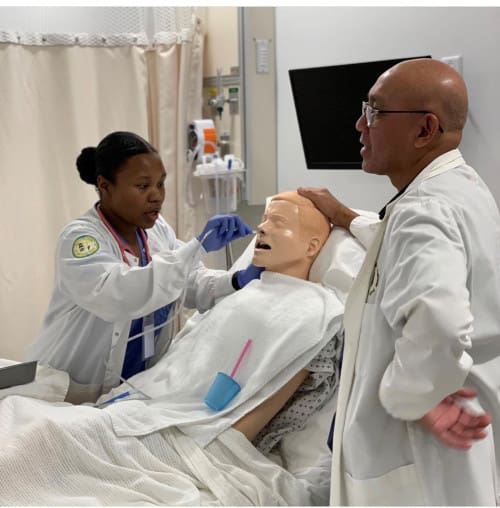
Admission to the Vocational Nursing Program

Admission to the Vocational Nursing Diploma Program is designed to select students who demonstrate the potential for success in the nursing field. The program has established a set of criteria to ensure that incoming students are well-prepared for the rigorous academic and clinical training they will undergo.
Admission Requirements
- Pass the Wonderlic (SLE) Exam: Candidates must achieve a minimum score of 18 or pass the TEAS VI entrance exam with a minimum score of 50.0% to be considered for admission.
- Pre-Vocational Nursing Program Academic Preparatory Course: Applicants are required to successfully complete the ATI SmartPrep course as a mandatory learning activity before commencing the Vocational Nursing Program.
- Academic Performance: Students must complete all terms/systems with a grade of 75% or higher. Additionally, to graduate and be eligible to take the NCLEX exam, students must score 90% or higher on the ATI Exit Examination.
- Skill Proficiency: Meet all clinical, clerical, classroom, and laboratory skill proficiency standards as applicable.
- Clinical and Externship Requirements: Complete all clinical and externship hours with satisfactory evaluations.
- Financial Obligations: Fulfill all financial obligations to the College prior to graduation. This includes attending Graduate and Financial Aid Exit Interviews, as applicable.
Turn my Passion Into a Career
All fields required*
These requirements are put in place to ensure that students are fully prepared to embark on their journey to becoming competent and compassionate vocational nurses, equipped with the knowledge and skills necessary to excel in their future careers. For detailed guidelines and additional information, prospective students are encouraged to refer to the Vocational Nursing Program’s student handbook.
Faculty Qualifications and Expertise

The faculty at CNI College are distinguished by their exceptional academic qualifications and extensive professional experience, ensuring a dynamic and enriching educational environment for students. Our faculty members are carefully selected to bridge the gap between textbook theory and practical application, bringing a well-rounded perspective to the classroom. With many holding advanced degrees and industry certifications, our instructors have not only excelled in their respective fields but also embody the commitment to excellence that CNI College stands for. As active professionals within the disciplines they teach, they offer students invaluable insights and the benefits of real-world experience, enhancing the learning experience with practical knowledge and current industry practices. This blend of academic rigor and professional expertise equips CNI College students with the comprehensive education needed to succeed in their future careers.
Vocational Nursing Faculty
Director of VN, Theory/Clinical Instructor
Grand Canyon University, Stanbridge University, Manila Doctor’s College
Clinical Instructor
University of Philippines, West Coast University, Concorde College
Instructor
Stanbridge College, Westcoast University
Instructor
University of Wisconsin, Madison
Clinical Experience and Hands-on Training

The Clinical Experience and Hands-on Training component of the Vocational Nursing Program is designed to ensure students develop the necessary skills for competent care of both acutely and chronically ill clients. Through immersive learning experiences in various structured settings, including hospitals, skilled nursing facilities, clinics, doctor’s offices, long-term care facilities, correctional facilities, home health care, and nursing registries, students gain the practical knowledge required to excel in their nursing careers. The program focuses on teaching students a wide range of essential nursing care skills within the vocational nurse’s scope of practice. These skills encompass basic hygienic and nursing care, vital signs measurement, client assessment, accurate documentation, execution of prescribed medical treatments, administration of medications, and the performance of non-medicated intravenous therapy and blood withdrawal, with the latter requiring additional Board certification. This comprehensive approach to clinical training prepares students to confidently address patient needs and contribute effectively to healthcare teams.
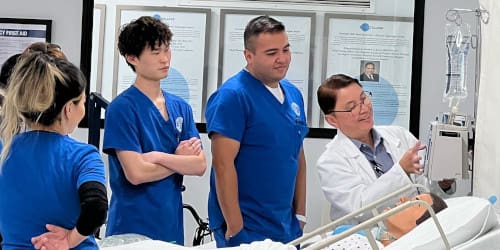
Student-to-Faculty Ratio
We place a strong emphasis on maintaining an optimal student-to-faculty ratio to enhance learning outcomes and ensure personalized instruction. For theoretical classes, the average class size is maintained at around 30 students, fostering an environment conducive to interactive learning and individual attention. In clinical rotations, the ratio is significantly reduced, with groups typically comprising 8-10 students, and often as few as 6. This smaller setting allows for more direct supervision and guidance from faculty members, ensuring that students receive the focused, hands-on experience they need to develop their nursing skills effectively and confidently.
Supporting Your Academic and Career Journey

At CNI College, we are dedicated to supporting your academic and career journey from the moment you enroll in our Vocational Nursing Program until long after you graduate. Our Career Services team is committed to providing comprehensive career preparation and placement assistance, working closely with students throughout the duration of their program. This ensures that you are not only academically prepared but also ready to face the challenges and opportunities of the real world.
Beyond career support, CNI College enhances student success through our Student Services Department, offering resources for personal challenges. We also host a chapter of the National Student Nurses Association (CNSA), providing unique benefits such as leadership opportunities, extracurricular activities, and community service projects. Membership in CNSA empowers students with a competitive edge and a platform for influence at both state and national levels. Our chapter’s active engagement, including a CNI College student serving as the statewide CNSA president, exemplifies our commitment to leadership development and community impact.
Financial Aid and Scholarships
CNI College offers robust financial aid services and advising for students pursuing healthcare careers, starting from admission. Our knowledgeable financial aid team guides students through understanding financial aid criteria and managing responsibilities, while admission advisors ensure students are well-informed about nursing employment requirements. Financial support includes grants applied directly to student accounts, with refunds issued for any excess. Cal Grant payments match only the actual tuition and fees, ensuring equity. California state grants and veterans’ education benefits under Chapters 31 and 33 are also processed timely, directly benefiting students’ accounts and supporting their educational endeavors without financial strain.
Job Placement and Career Opportunities
At CNI College, we ensure our students’ education is complemented with robust career preparation and placement assistance, boasting a placement rate of 71.43% for the 2022-2023 VN program. Our dedicated Career Services team works closely with students throughout their program, extending support through the Student Services Department for any personal issues impacting success. We successfully place graduates in diverse healthcare settings, such as skilled nursing facilities, hospitals, and home health companies, offering roles that range from full-time to per diem based on individual preferences. Our personalized approach includes one-on-one sessions post-licensure to discuss potential opportunities, assist with resume forwarding, and continuously share job opportunities until each graduate secures employment, ensuring a seamless transition into their nursing careers.
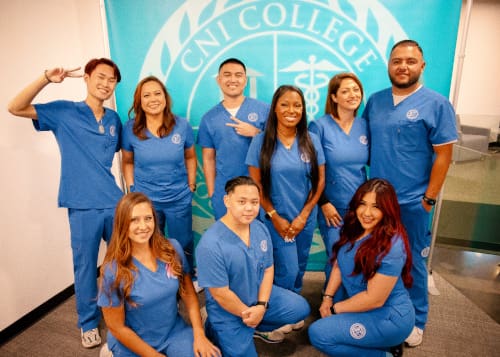
Accreditation and Licensing

CNI College, as a private institution, proudly holds approval to operate from the California Department of Consumer Affairs Bureau for Private Postsecondary Education, in accordance with California Education Code Section 94302. This approval signifies that CNI College meets the rigorous standards set under the law for occupational instruction provided by private postsecondary educational institutions. It reflects our commitment to offering high-quality educational programs that comply with the established legal requirements, ensuring our students receive education that is not only comprehensive but also recognized and respected within the professional community.
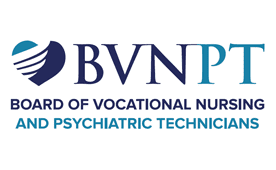
1747 N. Market Blvd., Suite 225
Sacramento, CA 95833
Phone: (916) 263-7800
Fax: (916) 263-7857
www.bvnpt.ca.gov
Why Choose CNI College's Vocational Nursing Program?

Choosing CNI College’s Vocational Nursing Program offers several distinct advantages that set it apart from other nursing programs. Our program is designed to focus on the practical skills and knowledge essential for a career as a Licensed Vocational Nurse (LVN), emphasizing hands-on training and real-world experiences to ensure students are workforce-ready in the shortest possible time. Additionally, CNI College offers unparalleled career support services, assisting students in job placement and career advancement through resume building, interview preparation, and providing networking opportunities with potential employers. These elements combine to make our Vocational Nursing Diploma Program a superior choice for those aspiring to enter the nursing field efficiently and effectively.
Unique Facilities and Campus Resources
CNI College’s Nursing Program Learning Center is distinguished by its advanced facilities and comprehensive campus resources designed to enhance the educational experience of our students. The Center boasts nursing simulation rooms, skills laboratories, and modern classrooms equipped with WIFI and advanced learning technology, accommodating varying student capacities and facilitating a conducive learning environment. The science lab features computer-assisted virtual labs and is complemented by a library study room, student lounge, and extensive computer access, including personal laptops for BSN students, ensuring all have the tools necessary for success.
Central to our hands-on training approach are the Skills Lab and Simulation Lab, which replicate real-world acute care settings with high-fidelity patient simulators, including specialized setups for medical-surgical, pediatric, and OB care. These labs are equipped with a range of medical equipment and simulation manikins, supporting skills development in a controlled environment. Additional facilities include a media/observation room for debriefing and a clinical lab pack provided to each student, containing essential equipment and supplies for individual use. The labs operate extensive hours, staffed by dedicated faculty to support student learning and clinical practice, ensuring our graduates are well-prepared for their nursing careers with practical experience and competency.

Success Stories and Testimonials
“After 2 years I took my NCLEX and all I had learned from my instructors n ATI at the same time helped me so much. I didn't use ATI for studying I did uworld and it was one of the best choices to study. At 75 questions and first try blessed me I passed my test and now I'm an LVN. It's motivation from you but mostly the help u get from ur teachers and the best you can do to be where life will take u.”
– Nayely R. VN Graduate
“I called CNI College regarding information on a Medical Assistant program which was discontinued. However, Mahoganee, the admissions advisor, informed me about the LVN program which was accelerated so I could complete it in 12 months! There were 2 weeks left until the next cohort started so Mahoganee helped me submit everything I needed before the program started. …am so glad I enrolled into this program!”
– Blessings K. VN Graduate
Apply Now and Visit CNI College

Embarking on your educational journey at CNI College is streamlined to guide you through every step of the process. Whether you’re ready to apply, seeking more information, or interested in experiencing our campus first-hand, we’ve made sure you have all the options you need at your fingertips:
- Online Application: Jumpstart your journey by filling out the online application form to join our community.
- Request Info: For detailed insights into our programs and how they align with your career goals, our ‘Request Info’ form is readily available to provide you with comprehensive information.
- Schedule a Visit: Experience the vibrant CNI College campus environment and facilities firsthand by scheduling a visit through our visit form, offering you a glimpse into life at CNI College.
At CNI College, we’re dedicated to making your transition into our educational programs as smooth and informative as possible. From the initial application to the final decision of joining our community, we’re here to support you every step of the way, ensuring you’re well-informed and confident in your choice to pursue your education with us.
